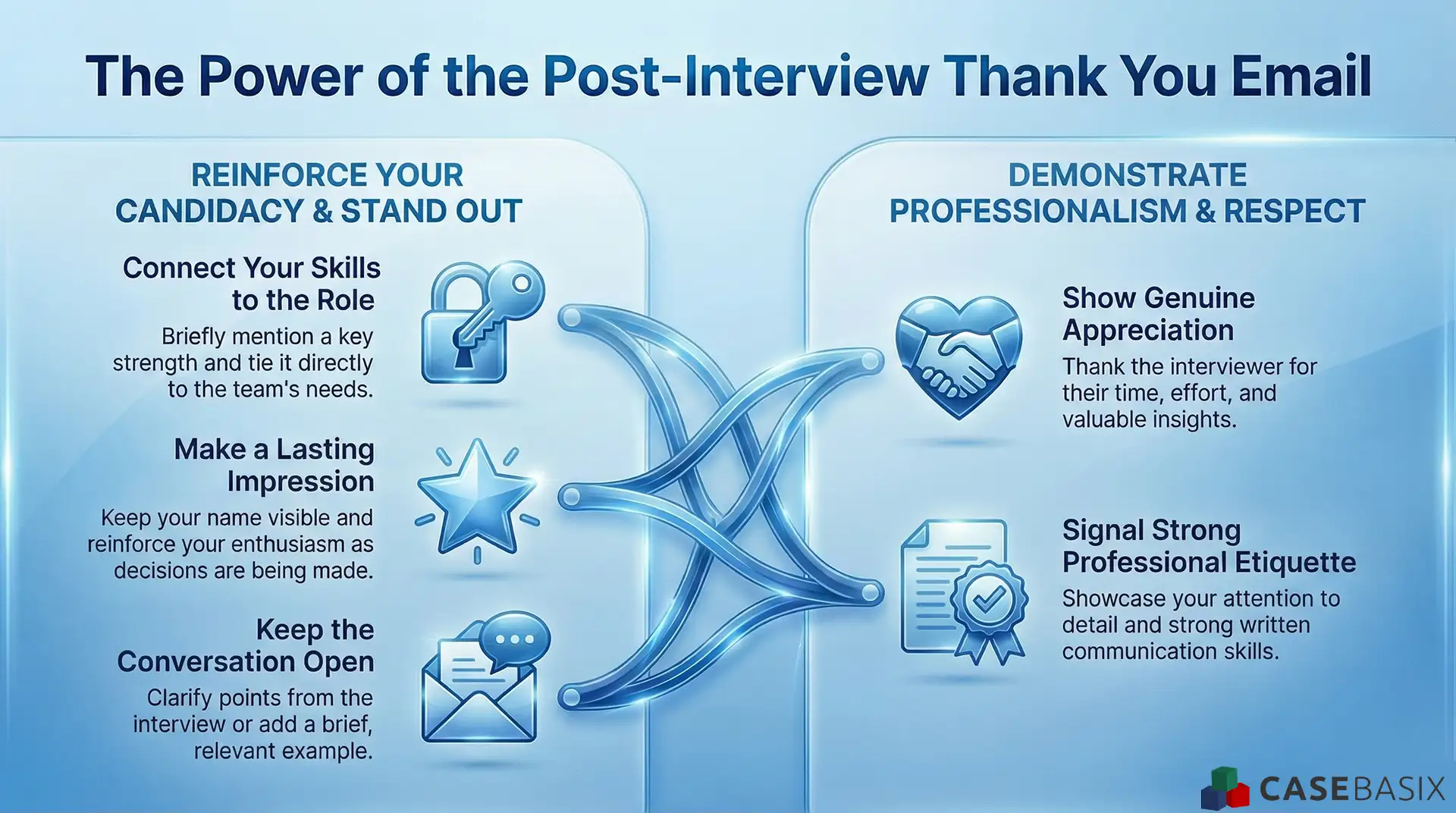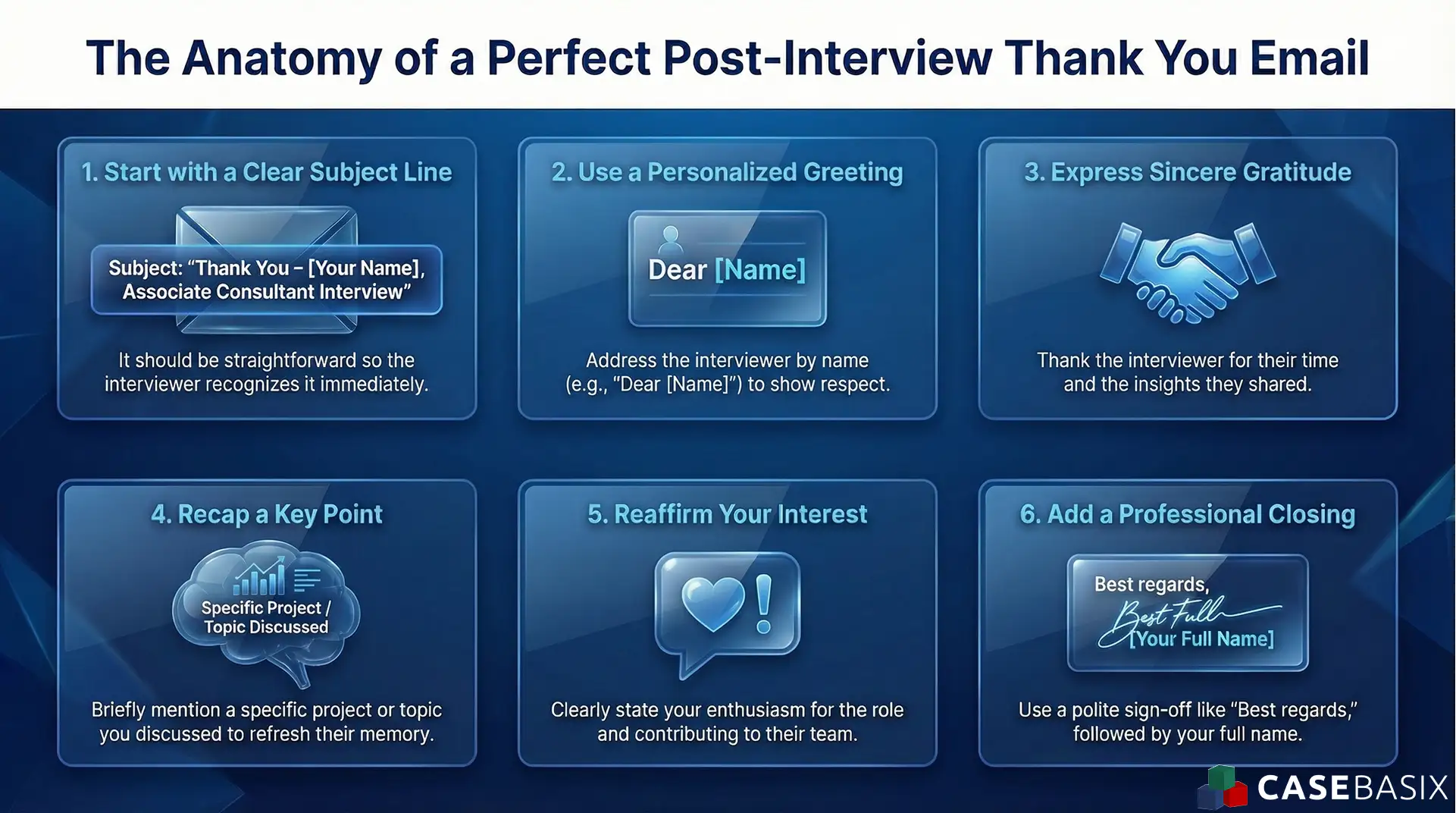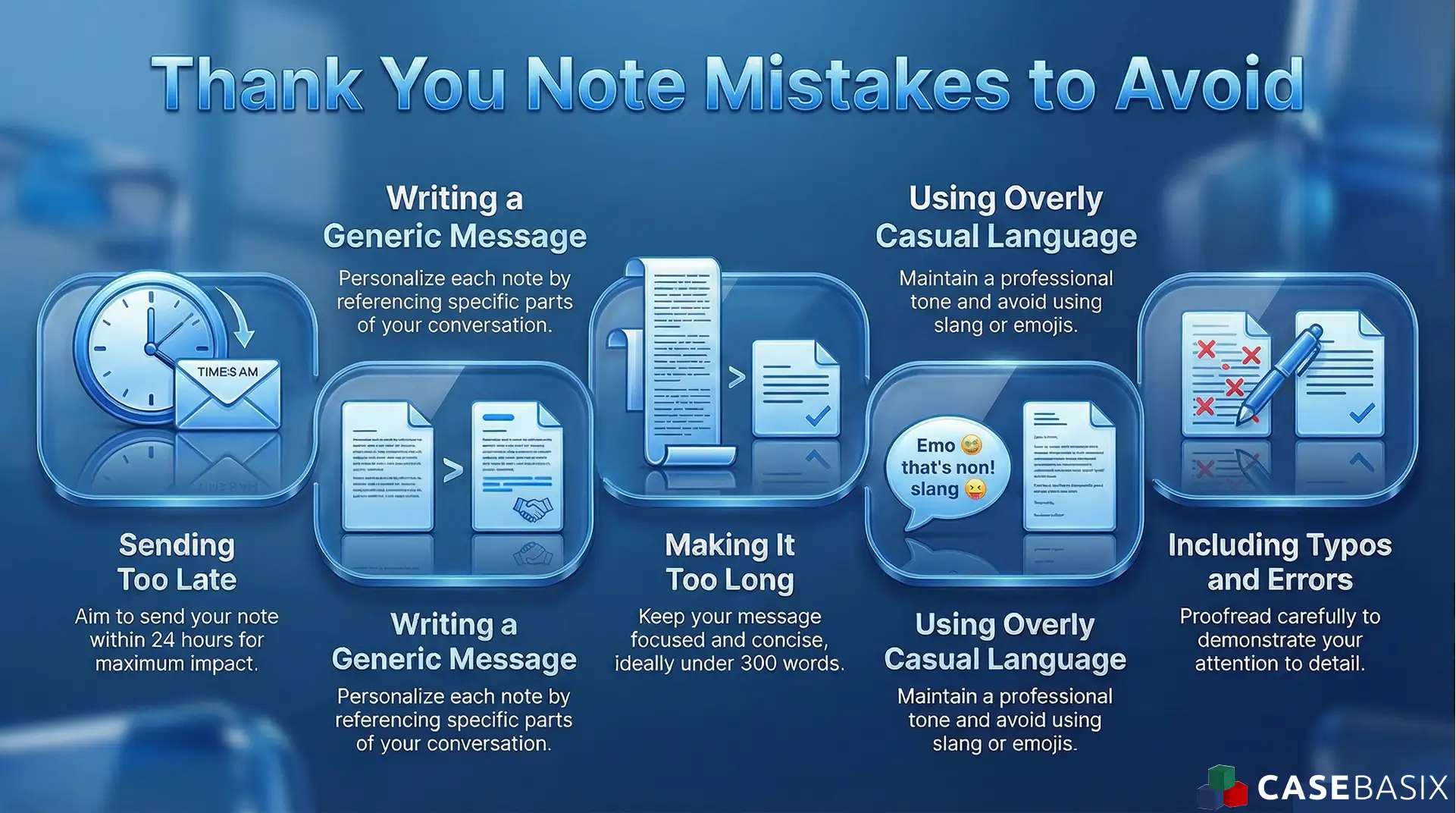Consulting Articles > Consulting Networking > Thank You Email After Interview: Professional Guide to Writing
Sending a thank you email after interview is a small step that can have a big impact. It shows professionalism, reinforces your interest in the role, and helps you stand out from other candidates. Many recruiters see thoughtful follow-up emails as a signal of both attention to detail and genuine enthusiasm.
In this article, we will explore how to craft the right message, when to send it, and the common mistakes you should avoid.
TL;DR – What You Need to Know
A thank you email after interview demonstrates professionalism, reinforces your interest in the position, and helps you stand out in a competitive hiring process.
- Send your thank you email within 24 hours to show attentiveness and reinforce your interview impression.
- Personalize your message by referencing specific details from your conversation to make it memorable.
- Include clear components: subject line, greeting, gratitude, recap, statement of interest, and professional closing.
- Keep your email concise under 300 words to maintain impact and respect the interviewer’s time.
- Send a handwritten note only after emailing, ideally following a final or senior-level interview.
Table of Content:
- What is the Purpose of a Thank You Email After Interview?
- When Should You Send Your Post-Interview Thank You?
- How Do You Personalize a Thank You Note?
- Key Components of a Professional Thank You Email
- How Long Should a Thank You Email Be?
- Handwritten Notes: Should You Send Them?
- Best Subject Line Examples
- How to Follow Up If You Don’t Get a Reply
- Common Mistakes to Avoid
- Final Thoughts
- Frequently Asked Questions
What is the purpose of a thank you email after an interview?

This infographic shows how a thank you email after an interview reinforces your candidacy while demonstrating professionalism and respect.
A thank you email after interview helps reinforce your strengths while leaving a positive and memorable impression. This visual highlights how a thoughtful message can show appreciation, signal professionalism, and keep the conversation open after your meeting. Understanding these elements helps you send a note that adds real value to your candidacy.
A thank you email after interview demonstrates appreciation, reinforces your interest in the position, and reminds the interviewer of your qualifications. It also signals strong interview etiquette and helps you remain memorable in a competitive hiring process.
Showing Appreciation
The most immediate purpose is to express gratitude. By acknowledging the interviewer’s time and effort, you show respect and build goodwill.
- Thank them for the opportunity to interview
- Acknowledge the value of their insights
- Recognize their busy schedule
Reinforcing Your Fit
Your thank you note is a chance to briefly connect your skills to the role. This strengthens your candidacy without repeating your entire resume.
- Mention one or two key strengths
- Tie these directly to the role or team needs
- Keep the focus on relevance, not repetition
Keeping the Conversation Open
A thoughtful email allows you to clarify points or expand on ideas that came up during the interview.
- Address a topic you wish you explained better
- Add a brief example that reinforces your response
- Invite them to reach out if more information is needed
Demonstrating Professionalism
Recruiters pay close attention to follow-up communication. A thank you note signals that you understand professional etiquette.
- Shows attention to detail
- Demonstrates strong written communication skills
- Highlights interpersonal awareness
Making a Lasting Impression
Even in a competitive process, a clear and genuine thank you helps you remain top of mind.
- Keeps your name visible as decisions are made
- Reinforces enthusiasm for the opportunity
- Builds stronger rapport for future interactions
When should you send your post-interview thank you to maximize impact?
You should send your post interview thank you email within 24 hours of the conversation. This timing ensures the discussion is still fresh, demonstrates promptness, and allows the interviewer to consider your note before making decisions. Sending too late or too soon may reduce its impact.
Why Timing Matters
The closer your email is to the interview, the more likely the interviewer will connect it to your conversation. Quick follow-up shows attentiveness.
- Keeps your name top of mind
- Reinforces your interest before decisions are made
- Signals respect for professional etiquette
Same Day vs. Next Day
Most career experts recommend sending your thank you email either the same day (a few hours later) or by the following morning. This balance avoids appearing rushed while still being timely.
- Same day: effective for short phone screens or early rounds
- Next morning: better for final or longer interviews
Avoiding Delays
Waiting more than 48 hours can make your note feel like an afterthought. At that point, the hiring team may already be leaning toward other candidates.
- Send within one day for maximum effect
- If delayed, still send, but acknowledge the timing politely
How do you personalize a thank you note to make it meaningful?
You can personalize a thank you note after interview by referencing specific details from your conversation, mentioning topics unique to the role, and showing genuine enthusiasm for the company. Personalization prevents your email from sounding generic and makes the message more memorable to the interviewer.
Referencing the Conversation
Pulling in details directly from the interview shows you were engaged and attentive.
- Mention a specific project, client, or challenge they discussed
- Highlight an interviewer’s insight that resonated with you
- Reconnect a story or case study you discussed
Connecting Skills to the Role
Tailor your thank you email to reinforce how your strengths align with the team’s needs.
- Refer to one or two key skills emphasized in the interview
- Tie them back to how you can add value to the role
- Keep this section concise to avoid repetition of your resume
Demonstrating Genuine Interest
Interviewers notice when candidates show sincere curiosity. Personal touches reflect more than just professional courtesy.
- Express enthusiasm for their team or company mission
- Share why their role excites you personally
- Use a warm but professional tone
Avoiding Generic Templates
Generic thank you emails can feel impersonal and forgettable.
- Do not copy and paste the same email to every interviewer
- Customize subject lines and greetings
- Adjust examples to fit each conversation
What key components should a professional thank you email include?

This infographic breaks down the essential steps for writing a polished and effective thank you email after an interview.
A strong thank you email after interview follows a clear structure that helps you communicate gratitude and reinforce your fit for the role. This visual highlights each step, from crafting a direct subject line to closing professionally. Using this framework ensures your message is concise, memorable, and aligned with interview expectations.
A professional thank you email after interview should include a clear subject line, a personalized greeting, an expression of gratitude, a recap of key points, a statement of interest in the role, and a professional closing. These elements ensure your message is both polished and memorable.
Subject Line
Your subject line should be straightforward and professional so the interviewer recognizes the email immediately.
- Example: “Thank You – [Your Name], Associate Consultant Interview”
- Keep it short and clear
- Avoid creative or vague subject lines
Personalized Greeting
Start with the interviewer’s name to show respect and attentiveness.
- Use “Dear [Name]” rather than generic greetings
- Double-check spelling and titles
- Personalization signals care and professionalism
Expression of Gratitude
Thank the interviewer for their time and insights.
- Acknowledge the effort they took to meet you
- Reference appreciation for the conversation
- Keep this sincere and concise
Recap of Key Points
Briefly highlight one or two aspects of the interview that stood out.
- Mention a project, value, or topic you discussed
- Tie it back to your skills or experiences
- Keep this section short and specific
Statement of Interest
Reaffirm your enthusiasm for the role and company.
- Express excitement about contributing to their team
- Highlight alignment with their mission or goals
- Avoid overstating or sounding desperate
Professional Closing
End with a polite sign-off and contact information.
- Use closings like “Best regards” or “Sincerely”
- Include full name and email/phone number
- Keep tone warm but professional
How long should a thank you email after interview be?
A thank you email after interview should be concise, ideally no longer than 250 to 300 words. The message should fit into three short paragraphs, balancing gratitude, a recap of key points, and a closing statement of interest. Lengthy emails risk losing impact.
Why Brevity Matters
Interviewers are busy and often review many candidates. A concise email shows respect for their time.
- Keeps the note easy to read
- Ensures the main message is clear
- Prevents overwhelming the recipient
Recommended Structure
Aim for three short sections that each serve a clear purpose.
- Paragraph 1: Express gratitude
- Paragraph 2: Recap highlights from the interview
- Paragraph 3: Reaffirm interest and close politely
Word Count Guidelines
Most career coaches recommend keeping the note under 300 words.
- 150 to 200 words is enough for early-round interviews
- Up to 300 words can be used for final interviews
- Always prioritize clarity over word count
Common Mistakes
Going too short or too long can reduce effectiveness.
- One-sentence thank you emails feel dismissive
- Multi-page emails seem excessive or desperate
- Keep tone balanced and professional
Should you send handwritten notes in addition to an email, and when?
You should send a handwritten thank you note only after first sending an email, since email is immediate and expected. A handwritten note can add a thoughtful touch in later rounds or after final interviews, but it should never replace a timely post interview thank you email.
Why Email Comes First
Email is the professional standard for follow-up communication.
- Reaches the interviewer within hours
- Keeps you top of mind while decisions are active
- Ensures no delay in expressing gratitude
When to Add a Handwritten Note
Handwritten notes are best for reinforcing enthusiasm after major milestones.
- After a final round interview
- When meeting multiple senior team members
- If you want to add a more personal touch
Benefits of Handwritten Notes
A physical note can strengthen your impression in a competitive process.
- Stands out in an inbox-driven world
- Demonstrates extra effort and thoughtfulness
- Creates a personal connection with the interviewer
Common Pitfalls to Avoid
Using a handwritten note incorrectly can backfire.
- Do not send only a handwritten note without an email
- Avoid overly casual language or decorative cards
- Keep the tone consistent with professional etiquette
What are the best subject line examples for a thank you email after interview?
The best subject lines for a thank you email after interview are short, professional, and include your name and the role. Clear subject lines ensure your message is noticed quickly and linked to your interview. Avoid vague or creative phrasing that may confuse the reader.
Why Subject Lines Matter
Interviewers receive many emails daily. A precise subject line ensures your thank you note is recognized immediately and taken seriously. It also reflects attention to detail, an important skill in consulting roles.
Effective Subject Line Examples
- Thank You – [Your Name], Consultant Interview
- Appreciation for Today’s Interview – [Your Name]
- Thank You for the Opportunity – Associate Consultant Role
- Grateful for Our Conversation – [Your Name]
Mistakes to Avoid
Subject lines that are too casual or unclear can undermine your professionalism.
- Do not write only “Thanks” or “Follow-up”
- Avoid emojis or unnecessary punctuation
- Skip overly long or generic subject lines
How can you follow up if you don’t get a reply to your thank you email?
If you do not get a reply to your thank you email after interview, wait about one week before sending a polite follow-up. This message should briefly restate your interest in the role, ask about next steps, and offer to provide additional information.
Why Patience Matters
Hiring timelines vary, and silence does not necessarily signal rejection. Waiting a full week shows professionalism while giving the employer space to complete their process.
What to Include in a Follow-Up
Your message should remain short and professional.
- Restate gratitude for the original interview
- Reaffirm your interest in the position
- Ask if any updates are available on next steps
- Offer to provide further details if needed
Common Mistakes to Avoid
Multiple or overly frequent follow-ups can hurt your candidacy.
- Avoid sending reminders every few days
- Do not sound impatient or frustrated
- Keep tone respectful and concise
What mistakes should you avoid in post-interview thank you notes?

This infographic shows the most common mistakes candidates make when writing a thank you email after an interview and how to avoid them.
Avoiding common thank you email mistakes helps ensure your message supports your candidacy rather than weakening it. This infographic highlights pitfalls such as waiting too long, using generic language, writing overly casual messages, or leaving typos. Understanding these issues makes it easier to send a polished and professional follow-up.
The most common mistakes in post interview thank you emails are sending them too late, writing generic messages, making the email too long, or including errors. Avoiding these pitfalls ensures your note strengthens rather than weakens your candidacy.
Sending Too Late
Timing matters. A note sent several days after the interview may seem like an afterthought. Aim to send it within 24 hours for maximum impact.
Writing a Generic Message
A copy-paste email sent to multiple interviewers can feel insincere. Personalize each note by referencing specific parts of your conversation.
Making It Too Long
Emails that read like essays may overwhelm a busy recruiter. Keep your message focused and under 300 words.
Overly Casual Language
Your tone should remain professional. Avoid slang, emojis, or overly friendly phrasing that reduces credibility.
Typos and Errors
Mistakes in spelling, grammar, or formatting reflect poorly on attention to detail. Proofread carefully before sending.
Final Thoughts
A thank you email after interview is more than a courtesy, it’s an important step in showing professionalism, reinforcing your fit, and keeping your candidacy strong. By sending it promptly, personalizing your message, and avoiding common mistakes, you increase your chances of leaving a lasting impression. Thoughtful follow-up can set you apart in a competitive hiring process and demonstrate the attention to detail valued in consulting careers.
Frequently Asked Questions
Q: Is sending a thank you email after an interview desperate?
A: Sending a thank you email after interview is not desperate, it shows professionalism, good interview etiquette, and genuine interest in the role. Employers view it as a positive candidate follow up.
Q: Are thank you emails after interviews still a thing?
A: Yes, thank you emails after interviews are still important. A post interview thank you email demonstrates professionalism, reinforces your fit, and helps you stand out in the hiring process.
Q: Do you need to send a thank you email after a 30 minute interview?
A: Yes, you should send a thank you email after a 30 minute interview. Even short meetings benefit from a professional thank you message that shows appreciation and attention to detail.
Q: How do I write a thank you note to a recruiter?
A: To write a thank you note to a recruiter, keep it professional and concise. A personalized thank you email should thank them for their time, confirm your interest, and follow standard interview thank you letter format.
Q: How do I know if an interview went well?
A: You may know an interview went well if the conversation felt engaging, the interviewer discussed next steps, or asked about your availability. Pairing this with a timely interview follow up email strengthens your candidacy.




